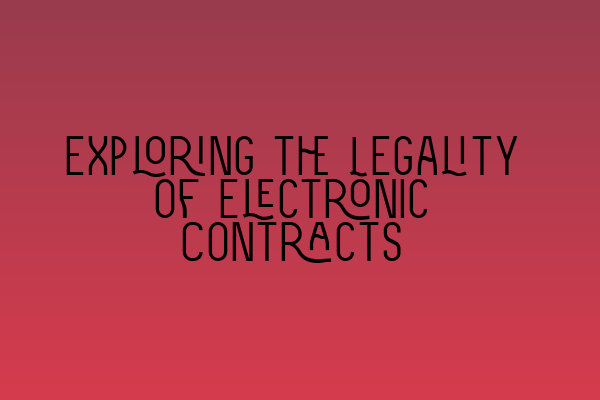As technology continues to advance, businesses are increasingly relying on electronic contracts to streamline their operations. Electronic contracts offer convenience and efficiency, allowing parties to enter into agreements without the need for physical paperwork. However, with this convenience comes the question of legality. Are electronic contracts legally binding? In this article, we will explore the legality of electronic contracts and provide insights into their enforceability.
What is an Electronic Contract?
An electronic contract, also known as an e-contract or digital contract, is an agreement created and signed electronically, without the need for traditional pen and paper. It involves the use of electronic means, such as email, online forms, or electronic signatures, to express consent and form a legally binding agreement.
Electronic contracts can be used for various types of agreements, including sales contracts, service contracts, employment contracts, and non-disclosure agreements. The key element in electronic contracts is the intention of the parties to create legally binding obligations electronically.
Legality of Electronic Contracts
The legality of electronic contracts varies from jurisdiction to jurisdiction. However, many countries, including the United Kingdom, recognize electronic contracts as legally binding under certain conditions. In the UK, electronic contracts are governed by the Electronic Communications Act 2000 and the Electronic Signatures Regulation 2002.
Under these laws, electronic contracts are considered valid as long as:
- The parties involved have the intention to create a legally binding agreement.
- There is an offer and acceptance of the terms of the contract.
- The parties have the legal capacity to enter into the contract.
- The contract meets any specific formal requirements, such as the use of electronic signatures.
It is important to note that the legal requirements for electronic contracts can vary depending on the nature of the agreement and the industry involved. For example, certain contracts, such as those relating to the sale of land or wills, may have additional requirements that must be met to be considered valid.
Enforceability of Electronic Contracts
One of the concerns often raised about electronic contracts is their enforceability. Can parties effectively enforce the terms of an electronic contract in court? The answer is generally yes. Courts have increasingly recognized the validity and enforceability of electronic contracts, provided they meet the necessary legal requirements.
For an electronic contract to be enforceable, it must fulfill the same basic elements as a traditional contract, such as offer, acceptance, consideration, and intention to create legal relations. Additionally, the parties must have given genuine consent to the terms of the contract, and the contract should not be tainted by any vitiating factors, such as fraud, duress, or mistake.
In case of a dispute, the courts will examine the evidence surrounding the formation and intent of the electronic contract. This may include examining emails, electronic signatures, digital records, and other forms of electronic communication. The courts’ main concern is to determine the parties’ true intentions and ensure fairness in the enforcement of the contract.
Best Practices for Electronic Contracts
To ensure the enforceability of electronic contracts, parties should follow some best practices:
- Use secure and reliable electronic platforms or software: It is essential to use trusted electronic platforms or software to create, sign, and store electronic contracts. This helps ensure the integrity and authenticity of the contract.
- Clearly indicate the consent of the parties: Make it clear that the parties agree to enter into a legally binding contract electronically. This can be done through explicit statements, checkboxes, or electronic signatures.
- Maintain comprehensive records: Keep detailed records of the electronic contract, including all relevant communications, revisions, and signatures. This can be helpful in case of a dispute or for future reference.
- Seek legal advice if necessary: If you have concerns about the legality or enforceability of an electronic contract, it is advisable to seek legal advice. An experienced solicitor can guide you through the process and ensure compliance with applicable laws.
Conclusion
Electronic contracts have become an integral part of modern business transactions. While their legality may be questioned by some, they are generally recognized as enforceable when they meet the necessary legal requirements. By following best practices and seeking legal advice when needed, businesses can confidently enter into electronic contracts and enjoy the benefits of efficiency and convenience.
For further information on SQE contract law and exam preparation, you may find the following articles helpful:
